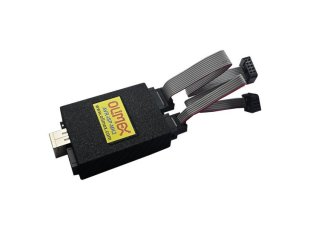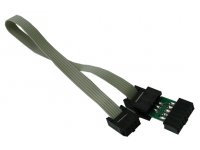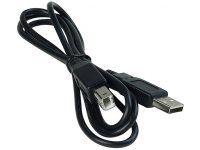≡







AVR-ISP-MK2







Olimex AVR-ISP-MK2 USB2.0 Microchip Atmel AVR ISP MKII compatible AVR programmer with ICSP PDI TPI support
| Price | 19.95 EUR |
|---|---|
| 10 - 49 pcs | 17.96 EUR |
| 50 - 10000 pcs | 15.96 EUR |
AVR-ISP-MK2 supports the programming of Atmel 8-bit AVR microcontrollers with ISP, PDI or TPI interfaces. Using the Microchip studio software, designers can program AVR devices using the ISP Interface, tinyAVR devices using the TPI interface, and AVR XMEGA devices using the PDI Interface. The programmer also works with AVRDUDE.
FEATURES
- Tested and working with Microchip Studio 7, Atmel Studio 7, Atmel Studio 6, AVR Studio 5, AVR Studio 4
- Tested and working with Arduino and AVRDUDE
- Tested and working with Windows XP, Windows 7, Windows 10, Windows 11, Debian Linux, Ubuntu
- Connects to PC via USB type B at USB 2.0 full speed
- No need for external power supply as it takes the power supply from USB
- Uses Atmel's 2x5 pin ICSP and 2x3 pin PDI and TPI connector layout
- Works with 5V and 3.3V targets and can power the target (jumper selectable)
- Programs both flash memory and EEPROM
- Supports fuses and lock bit programming
- Crystal calibration OSCCAL support
- Upgradeable for future device support
- Supports target voltages from 1.8V to 5.5V
- Adjustable ISP programming speed (50Hz to 8MHz SCK frequency)
- Dimensions: (45x30) mm ~ (1.7x1.2)" + 20 cm ~ 8" cable
DOCUMENTS
HARDWARE
FAQ
- Does the firmware of AVR-ISP-MK2 differ from the original Atmel firmware?
- Yes, the firmware of AVR-ISP-MK2 is based on the LUFA project by Dean Camera. It is a constant work-in-progress.
- I use Windows 10 and Atmel Studio 7 but I have some problems connecting to AVR-ISP-MK2?
- Try the driver inside the following archive (there are installation instructions inside): recommended drivers
- Previously I used AVR Studio 4 successfully but when I installed Microchip Studio 7 I can no longer connect to AVR-ISP-MK2 in AVR Studio 4. What can I do to use AVR Studio 4 and Microchip Studio 7 at the same time?
- The drivers installed with Microchip Studio 7 overwrote the drivers that worked with AVR Studio 4. These drivers are not compatible you would have to downgrade the drivers manually. The official Microchip workaround can be found here: https://microchip.my.site.com/s/article/Downgrading-tools-to-use-older-Jungo-driver
- I want to use AVR-ISP-MK2 with Arduino IDE. What should I do?
- It should work out-of-the-box - no changes required. Make sure you are using latest firmware. Make sure you are using the suggested drivers.
- I have performed a firmware change. My drivers are properly installed. Still I can't properly program my target with AVRDUDE. I also tested with the latest Arduino IDE. What is the problem? Is my programmer bricked?
- Make sure to update the firmware to the latest one and test again.
SUPPORTED DEVICES
- XMEGA Devices: ATxmega16A4U, ATxmega32A4U, ATxmega64A3U, ATxmega128A3U, ATxmega192A3U, ATxmega256A3U, ATxmega256A3BU, ATxmega64B3, ATxmega128B3, ATxmega64B1, ATxmega128B1, ATxmega16A4, ATxmega32A4, ATxmega64A4U, ATxmega128A4U, ATxmega64A3, ATxmega128A3, ATxmega192A3, ATxmega256A3, ATxmega256A3B, ATxmega64A1, ATxmega128A1, ATxmega16D4, ATxmega32D4, ATxmega64D4, ATxmega128D4, ATxmega64D3, ATxmega128D3, ATxmega192D3, ATxmega256D3
- MegaAVR Devices: ATmega48, ATmega48A, ATmega48P, ATmega48PA, ATmega8, ATmega8515, ATmega8535, ATmega88, ATmega88A, ATmega88P, ATmega88PA, ATmega8A, ATmega16, ATmega162, ATmega164A, ATmega164P, ATmega164PA, ATmega165P,ATmega165PA, ATmega168, ATmega168A, ATmega168P, ATmega168PA, ATmega16A, ATmega32, ATmega324A, ATmega324P, ATmega324PA, ATmega325, ATmega3250, ATmega3250A, ATmega3250P, ATmega325A, ATmega325P, ATmega325PA, ATmega328, ATmega328P, ATmega32A, ATmega64, ATmega640, ATmega644, ATmega644A, ATmega644P, ATmega644PA, ATmega645, ATmega6450, ATmega6450A, ATmega6450P, ATmega645A, ATmega645P, ATmega64A, ATmega128, ATmega1280, ATmega1281, ATmega1284, ATmega1284P, ATmega128A, ATmega2560, ATmega2561, AT90CAN128, AT90CAN32, AT90CAN64, ATmega16M1, ATmega32M1, ATmega64M1, AT90PWM1, AT90PWM161, AT90PWM216, AT90PWM2B, AT90PWM316, AT90PWM3B, AT90PWM81, AT90USB1286, AT90USB1287, AT90USB162, AT90USB646, AT90USB647, AT90USB82, ATmega16U2, ATmega16U4, ATmega32U2, ATmega32U4, ATmega8U2, ATmega169A, ATmega169P, ATmega169PA, ATmega329, ATmega3290, ATmega3290A, ATmega3290P, ATmega329A, ATmega329P, ATmega329PA, ATmega649, ATmega6490, ATmega6490A, ATmega6490P, ATmega649A, ATmega649P
- tinyAVR Device: ATtiny4, ATtiny5, ATtiny9, ATtiny10, ATtiny13A, ATtiny13, ATtiny20, ATtiny40, ATtiny24A, ATtiny24, ATtiny44A, ATtiny44, ATtiny84A, ATtiny84, ATtiny25, ATtiny45, ATtiny85, ATtiny261A, ATtiny261, ATtiny461A, ATtiny461, ATtiny861A, ATtiny861, ATtiny26, ATtiny2313A, ATtiny2313, ATtiny4313, ATtiny43U, ATtiny28L, ATtiny48, ATtiny88, ATtiny87, ATtiny167
- Automotive AVR Devices: ATtiny24, ATtiny44, ATtiny84, ATtiny25, ATtiny45, ATtiny85, ATtiny87, ATtiny88, ATtiny167, ATtiny261, ATtiny461, ATtiny861, ATmega48 , ATmega88 , ATmega168, ATmega328P, AT90CAN32 , AT90CAN64, AT90CAN128, ATmega32C1, ATmega64C1, ATmega16M1, ATmega32M1, ATmega64M1, ATmega164P, ATmega324P, ATmega644P, ATmega169P, ATmega48PA, ATmega88PA, ATmega168PA




